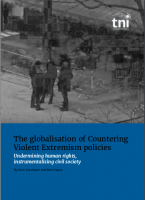Stranger than fiction How ‘pre-crime’ approaches to “Countering Violent Extremism” institutionalise islamophobia - A European Comparative Study
Regions
This publication compares Countering Violent Extremism (CVE) policies in Britain, France and the Netherlands - three European countries where Muslims form a minority. It also traces how, both through their overwhelming focus on Muslims, and by their nature as tools of lateral surveillance, they help institutionalise Islamophobic prejudice and suspicion.

Downloads
-
Stranger than fiction: How ‘pre-crime’ approaches to “Countering Violent Extremism” institutionalise islamophobia (PDF, 562.82 KB)Average time to read: 30 minutes minutes
-
La fiction dépasse la réalité (French version) (PDF, 661.88 KB)Average time to read: 30 minutes minutes
-
De fictie voorbij (Dutch version) (PDF, 695.67 KB)Average time to read: 45 minutes minutes
Authors
Download the full report in English, French, Dutch.
Introduction
Studies on the issue of “pre-crime” regularly, if not customarily, include references to Philip K. Dick’s short story ‘The Minority Report’, which initially coined the term - and rightfully so.
The story, written over half a century ago as a dystopian warning, remains deeply relevant, speaking to debates about free will, authoritarianism, the balance between freedom and the state; debates that continue to trouble us today.
Yet, at the same time as the question of “pre-crime” resonates with long-standing social and political anxieties, it is also a specifically present-day concern of politics and society - particularly in the context of pre-crime policies to counter violent “extremism”.
“Counter-extremism” policies are now a global phenomenon. This briefing paper will outline and compare the trajectories of pre-crime policies for Countering Violent Extremism (CVE) in Britain, France and the Netherlands - three European countries where Muslims form a minority. It will also trace how, both through their overwhelming focus on Muslims, and by their nature as tools of lateral surveillance, they help institutionalise Islamophobic prejudice and suspicion.
In short, CVE policies mutually reinforce and institutionalise a process whereby Muslims are discursively and politically constructed as a threat, and who progressively become subject to expanding techniques of surveillance. It is through CVE policies that institutionalised prejudice and suspicion against Muslim populations were regenerated and legitimised. This paper will consider CVE policies in relation to these two process ‘streams’.
In this paper we will look at the core concepts of CVE, provide background on the CVE programmes of the three countries concerned, and consider the role of CVE ‘science’ in legitimising Islamophobic prejudice inherent in the process. We will then turn to the role played by ‘ideology’ in CVE programmes, and how the ‘culture’, value-based and ideologi- cal framing of CVE policies have far-reaching ramifications for society, before tracing the shape of developments in the CVE field that advocates should be attentive to.
Britain has the most advanced and developed pre-criminal CVE policy today, in the form of its flagship PREVENT policy, which falls under its CONTEST (Countering Terrorism Strategy). PREVENT will therefore be the baseline against which we compare CVE policies in the Netherlands - which was claimed to be pioneering in Europe for its counter-extremism policies on Muslim citizens post-9/11 - and in France - which has in recent years belatedly begun to embrace and adopt the type of CVE model found across the continent.

